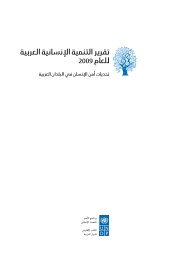- Page 2 and 3: United Nations Development Programm
- Page 5 and 6: Immersion, yes, but swamped or drow
- Page 7 and 8: level of development, help all its
- Page 9 and 10: interrelated issues in some depth.
- Page 11: ABBREVIATIONS AND ACRONYMSAFTAAHDIA
- Page 14 and 15: The Arab knowledge civilisation: so
- Page 16 and 17: Cultural interaction129CHAPTER 7SOC
- Page 18 and 19: 7.1 Patriarchal Society in Arab Cou
- Page 20 and 21: EXECUTIVE SUMMARYThe first Arab Hum
- Page 22 and 23: nowadays can provide the means to e
- Page 24 and 25: presence of significant human capit
- Page 26 and 27: movements with an Islamic mark unde
- Page 29 and 30: Arab citizens areincreasingly pushe
- Page 31 and 32: Constitutions, lawsand administrati
- Page 33 and 34: PART IChanges in human development
- Page 35 and 36: The challenge ofbuilding humandevel
- Page 37 and 38: The AHDR was a bellthat rang at the
- Page 39 and 40: Governments, statingconsiderations
- Page 41 and 42: BOX 6Human Rights Watch Report 2002
- Page 43 and 44: Occupation posed toIraqis a new cha
- Page 45 and 46: Arab countries, onaverage, continue
- Page 47: In most Arab countriesthe march of
- Page 51 and 52: CHAPTER 1Conceptual framework: know
- Page 53 and 54: level of society, between knowledge
- Page 55 and 56: it. As such, the returns to knowled
- Page 57 and 58: knowledge vary and interact, especi
- Page 59 and 60: of calculation systems and the util
- Page 61 and 62: BOX 1.5Ahmad Kamal Aboulmagd: Towar
- Page 63 and 64: Figure 1.4PC availability and Inter
- Page 65 and 66: PART IISection two: the state of kn
- Page 67 and 68: The most seriousproblem facing Arab
- Page 69 and 70: Communication ineducation is didact
- Page 71 and 72: One of the mainfeatures of manyuniv
- Page 73 and 74: The evaluation indicates that priva
- Page 75 and 76: Official Arab satellitechannels dom
- Page 77 and 78: The harassment ofthe press under th
- Page 79 and 80: Figure 2.7Personal computers: Arab
- Page 81 and 82: There is clearly alarger role for t
- Page 83 and 84: ooks for translation in order to fu
- Page 85 and 86: Arabic research activitycontinues t
- Page 87 and 88: Workers in scientific research andd
- Page 89 and 90: TABLE 3.3Number of scientific resea
- Page 91 and 92: Restricting intellectualfreedom is
- Page 93 and 94: Figure 3.3Number of publications -
- Page 95 and 96: when economic crises and security c
- Page 97 and 98: The main threat to freeliterature a
- Page 99 and 100:
CHAPTER 4Measuring knowledge capita
- Page 101 and 102:
noted, the current attempt to measu
- Page 103 and 104:
esearch and development and arts pr
- Page 105 and 106:
velopment. Does the disparity in hu
- Page 107 and 108:
ple)7. Book titles (per million peo
- Page 109 and 110:
Despite the methodological and othe
- Page 111 and 112:
Figure 5.1:Actors and linkages in t
- Page 113 and 114:
Industrial R&Dinstitutions are weak
- Page 115 and 116:
Until Arab countriesdevelop andseam
- Page 117 and 118:
Governments havelarge responsibilit
- Page 119 and 120:
sibilities of information and commu
- Page 121 and 122:
Joint Euro-Arab R&Dactivities in th
- Page 123 and 124:
PART IISection three: the cultural,
- Page 125 and 126:
The issue of Arabintellectual herit
- Page 127 and 128:
The Arab mentality (is)a system tha
- Page 129 and 130:
Heritage has been adynamic contribu
- Page 131 and 132:
BOX 6.3Al Kawakibi (1854-1902) Desp
- Page 133 and 134:
The Arabic language isthe distincti
- Page 135 and 136:
BOX 6.8Arab North Africa - Language
- Page 137 and 138:
The re-birth of theArabic language
- Page 139 and 140:
Traditionaloccupations and craftsar
- Page 141 and 142:
Arab contemporaryculture is general
- Page 143 and 144:
CHAPTER 7Socio-economic structureTh
- Page 145 and 146:
tivities.The first consequence of t
- Page 147 and 148:
also narrowed markets. Yet it is wo
- Page 149 and 150:
The volume of Arab capital invested
- Page 151 and 152:
BOX 7.1Patriarchal Society in Arab
- Page 153 and 154:
amid the contraction of domestic ec
- Page 155 and 156:
knowledge societies in Arab countri
- Page 157 and 158:
The isolation ofcultural elites has
- Page 159 and 160:
The goal should be toinstitutionali
- Page 161 and 162:
BOX 8.3Imam Muhammad Abduh(1849-190
- Page 163 and 164:
Penalties meted out tojournalists,
- Page 165 and 166:
Disregard forintellectual propertyp
- Page 167 and 168:
Concerns that theworld economicsyst
- Page 169 and 170:
BOX 8.6Trade and Development: Prebi
- Page 171 and 172:
CHAPTER 9A strategic vision: the fi
- Page 173 and 174:
1. UNLEASHING ANDGUARANTEEING THE K
- Page 175 and 176:
certed efforts of the state, civil
- Page 177 and 178:
programmes of higher education inst
- Page 179 and 180:
also initiate innovation: it could
- Page 181 and 182:
BOX 9.4Imams (religious leaders) ad
- Page 183 and 184:
cially useful in the production of
- Page 185 and 186:
just one external point of referenc
- Page 187 and 188:
ReferencesEnglish ReferencesAmnesty
- Page 189 and 190:
Egyptian Sociology". National Centr
- Page 191 and 192:
Maalouf, Amin, 2001.In the Name of
- Page 193 and 194:
Fasl Al-Makal fi Taqrir ma bain Al-
- Page 195 and 196:
Clovis Maksoud, Introduction to the
- Page 197 and 198:
Elements of opinion survey of Arab
- Page 199 and 200:
Table A-1NET ENROLMENT RATIOS (%) I
- Page 201 and 202:
Table A-5PUPILS PER TEACHER RATIO B
- Page 203 and 204:
Table A-9RELATIVE DISTRIBUTION OF T
- Page 205 and 206:
198 ARAB HUMAN DEVELOPMENT REPORT 2
- Page 207 and 208:
Table A-10VALUES OF INDICATORS ON K
- Page 209 and 210:
202 ARAB HUMAN DEVELOPMENT REPORT 2
- Page 211 and 212:
204 ARAB HUMAN DEVELOPMENT REPORT 2
- Page 213 and 214:
206 ARAB HUMAN DEVELOPMENT REPORT 2
- Page 215 and 216:
208 ARAB HUMAN DEVELOPMENT REPORT 2
- Page 217:
Table A-13VALUES OF KNOWLEDGE OUTCO







